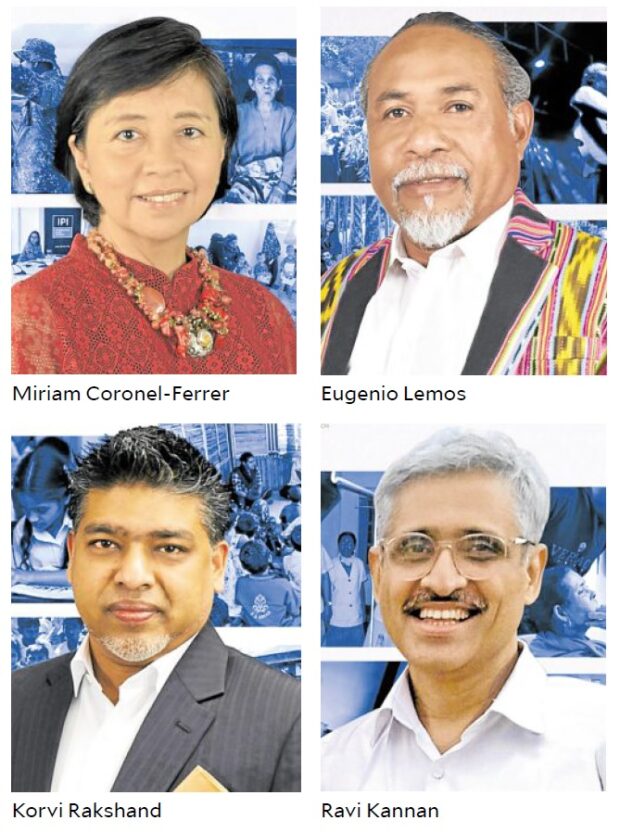PH peacebuilder among this year’s RM awardees
For being an exemplar of how women can create a just and peaceful world, Miriam Coronel-Ferrer, a former chief negotiator in the peace talks between the Philippine government and the separatist Moro Islamic Liberation Front, (MILF) was named one of the four laureates of the 65th Ramon Magsaysay Awards.
The Ramon Magsaysay Awards Foundation (RMAF) on Thursday recognized the Filipino peacebuilder and academician for her “deep, unwavering belief in the transformative power of non-violent strategies in peacebuilding, her cool intelligence and courage in surmounting difficulties.”
In a short speech during the online announcement of this year’s honorees, Coronel-Ferrer said she considered the award a reminder of the importance of women in building and sustaining national peace.
“Local peace is meaningless without the everyday peace experienced by ordinary people,” she said.
Other awardees
Also named laureates this year were Indian surgical oncologist Ravi Kannan for his propoor health and cancer care programs, Bangladeshi educator Korvi Rakshand for championing inclusive learning, and Timorese indigenous peoples champion Eugenio Lemos.
Article continues after this advertisementKannan, 59, exchanged a position in the city for a small hospital named Cachar Cancer Hospital and Research Centre (CCHRC).
Article continues after this advertisementUnder his helm, CCHRC became a full-fledged comprehensive cancer hospital and research center with 28 departments covering oncology, pathology, radiology, microbiology, epidemiology, tumour registry and palliative care.
Lemos established Permakultura Timor-Lorosa’e (Permatil), which helped train both Timorese youth in water and natural resource management, farming, aquaculture and agroforestry.
In 2007, Rakshand established JAAGO Foundation (Bangla word for “wake up”), that offers free, government-recognized English-language primary and secondary education to underprivileged children through 11 traditional and online schools.
Since the establishment of the Magsaysay Awards in 1958, 60 Filipinos have earned what is considered the Asian version of the Nobel Prize.
They include Coronel-Ferrer’s sister, veteran journalist and Philippine Center for Investigative Journalism founder Shiela Coronel, who was recognized in 2003 for her reporting during the Estrada administration.
The foundation and the award were named after the late President Ramon Magsaysay, whom RMAF touts as a man of greatness of spirit and who exemplified the “highest form of leadership.”
Over 300 individuals and institutions have been recognized for their “greatness of spirit and transformative leadership.”
Rooted in activism
A philosophy graduate from the University of the Philippines Diliman, Coronel-Ferrer drew from her experience as a student activist during martial law to pursue peacebuilding as a lifelong advocacy.
Since serving as chief negotiator between the Philippines and the MILF, she has been invited to be part of international teams looking into the conflict situations in East Timor and Cambodia. She had provided support work for the peace programs of the Carter Center in its work in Sudan and Syria.
In 2018, she became a member of the United Nations Standby Team of Senior Mediation Advisers, the only one from Southeast Asia.
Her other achievements include the drafting of the country’s first National Action Plan on Women, Peace and Security, which was adopted by the government in 2010 as part of its commitment to the UN Security Council Resolution 1325.
The landmark document calls on all UN member states to ensure the protection of women’s rights during armed conflicts, mainstream the gender perspective in peacekeeping and peacebuilding, and advance the role of women as peacebuilders at all levels of society.
Bangsamoro accord
With her at the helm of the peace talks, the Philippine government and the MILF also signed the Comprehensive Agreement on the Bangsamoro (CAB), ushering the transition process that created the new Bangsamoro entity.
The CAB has been described by international observers as a model for the integration of gender-responsive provisions and the inclusive participation of women and civil society organizations. “There is no perfect agreement,’’ she concedes. “But we make it more imperfect by leaving women out of the process.”
